- Home
- Martin Archer
Gulling The Kings
Gulling The Kings Read online
Book Twelve
The Saga of the Company of Archers Continues
Gulling the Kings
Constantinople was under siege and in the process of falling to the crusaders when the captain of a company of English archers and his men fought their way out of the Patriarch’s palace with the gold-coated right hand of Saint John which had baptized Jesus, the silver-coated head of Saint Paul, and other priceless relics of the Orthodox Church.
The archers carried the relics to their company’s home base in Cornwall, and then put out the story in the taverns and alehouses of Rome and various seaports that the Orthodox priests charged with rescuing the relics had succeeded in doing so, and had hidden them somewhere along an isolated section of the Greek coast. The priests, the archers freely admitted, had been carried there on one of the archers’ galleys chartered by the Orthodox Church.
Unfortunately, so the story was told, the priests required the archers to remain aboard their galley while the priests took the relics ashore and hid them. The priests were gone for three days before they returned and continued on to Piraeus.
Everyone, of course, wanted the relics, particularly the Pope in Rome; he saw them as a way to move some of the Orthodox believers to the churches and priests under the control of Rome. The Pope’s interest in having the relics in Rome and preventing the Orthodox Church from recovering them was quite understandable—it was well known that anyone who prayed in the presence of the relics and made sufficient donations was likely to have their prayers answered and, in any event, would spend less time in purgatory.
As a result of the relics’ great value and the huge benefits on offer from the Pope to anyone who would acquire them and donate them to Rome, the Greek coast was constantly searched without finding them—and the relics remained safe and undisturbed in the archers’ stronghold in Cornwall’s Restormel Castle. They stayed there until William, the captain of the company of archers, reached an agreement with Pope Innocent as to what should happen to the relics “if we should happen to find them.”
If the agreement the company of archers made with the Pope holds, it will truly be a deal made in heaven for everyone involved: the archers will get a king’s ransom in gold and coins in exchange for the relics, the Pope will get the relics without having to pay for them, and a handful princes and kings will avoid purgatory and get the Pope’s blessing for their claims and ambitions—but only if they acquire the relics “from whomever finds them” and donate them to the one true Church.
With the Pope’s agreement in hand and the Pope sending out parchments to various great princes announcing the substantial benefits that would accrue to anyone who acquired the relics and donated them to Rome, the archers waited a few months and then sent out their own couriers with parchments announcing that they had “found” the priceless relics. Fortunately for the princes, the announcement suggested the terms under which the archers would sell them. The fact that the Pope and a certain Cardinal Bertoli would each personally get a substantial share of the coins was never mentioned.
The archers’ problem, of course, was that the princes and kings would also be able to donate the relics to Rome and receive the many benefits on offer from the Pope if they seized the relics from the archers by force instead of paying for them. That was exactly what almost happened. King John wanted the relics so he could send them to Rome in exchange for the Pope’s recognition of his rights over England’s barons and to the lands he claimed in Normandy, the lands his brother Richard had lost to the armies of the French king while he was away crusading.
Since he was virtually landless and had no coins which he could use to buy the relics, King John had done the next best thing, he’d offered his dissident barons the concessions they wanted in exchange for the relics.
The barons may have been born to power but they were mostly illiterate and not the sharpest swords in the rack; they didn’t understand that the king would then have the power to take his concessions back, and reduce their powers even more, once he had the Pope’s support.
As a result, the barons mobilized their knights and village levies, and began the process of invading Cornwall to take the relics by force—and promptly had their heads handed to them, in some cases literally, by a few hundred of the Company of Archer’s horse-riding archers who came out of their base in western Devon, Okehampton Castle on the approaches to Cornwall, and rode circles around the barons’ knights and village levies in the Saracen way.
Cornwall’s archers, the surviving barons and their knights bitterly complained, “were commoners and didn’t fight fair.”
The fighting between the Company of Archer’s Okehampton-based horse archers and the dissident barons took place in Devon near the border with Cornwall and was over so quickly and decisively, in just a couple of weeks, that the main body of archers, the company’s heavily armed foot archers waiting in Cornwall at the Launceston ford to repel the barons and their men, were never involved in the actual fighting.
Hostilities had barely ended with the barons’ army being routed and the main force of archers marching into Devon on foot to help clean up the battlefields and visit nearby Okehampton, when word was received by the captain of the archers that a German prince was coming to buy the relics. He had good reason to do so because he was one of the two German princes seeking to obtain the Pope’s recognition and blessing as the emperor of the Holy Roman Empire.
The prince’s name was Otto of someplace called Swabia according to the names on the parchment Rome sent to the archers’ captain. He was on his way to Cornwall with a king’s ransom in coins to buy the relics—and an army of Germans which could be used to take them by force if the archers did not hand them over voluntarily.
Chapter One
William and the unexpected crisis.
Everything changed when the foot archers of our company were approaching Okehampton on the cart path that ran up to the castle from the London road. It happened whilst I was looking at the castle outlined against the distant sky and daydreaming about how pleasant it might be to celebrate the defeat of the barons’ army by once again spending some time with Isabel. That’s when gallopers came in from Restormel with an important parchment addressed to Captain William, me.
I knew the message they were carrying was important even before I opened the leather pouch because two gallopers had been sent to carry it in case one went down, and both were leading remounts. The gallopers and their lathered horses were breathing hard as one of them knuckled his forehead and handed me the pouch containing the message. I felt the first few drops of a coming rain as he did.
The parchment on which the message was written had come a long way in just a few days. It had been scribed by the newly frocked apprentice sergeant who had been sent to Haarlem to scribe for the senior sergeant in charge of the two galleys we had temporarily stationed there. The galleys had been sent there for just this purpose—to give us advance warnings of possible threats coming from the northern kings and princes who had been informed by the Pope about the relics.
What the couriers delivered was an alarming message from the senior sergeant in charge of the two galley. It warned me that one of the German princes the Holy Father had identified as being rich enough to be a potential buyer of the relics, Otto something or other from some castle in Germany called Swabia, was coming for the relics with both coins to buy them and a very large force of German knights and soldiers to guard them and keep them safe. Or take them.
The arrival of the German prince and his coins was all well and good and expected. My priestly older brother Thomas, now the Bishop of Cornwall with his title and diocese bought fair and square, had, at the suggestion of the Pope and with his approval, invited representatives of Otto and various other w
ealthy princes to come to Cornwall and buy the relics. The invitation, however, did not suggest they bring an army with them.
Delivery of the relics to their buyers was to be made in the Fowey estuary. That way we could use our archer-crewed war galleys to prevent them from being taken unless the required coins were paid. But there was a problem; according to Sergeant Jeffrey, the senior sergeant who sent in the report, the talk in the waterfront taverns of Haarlem, the port where the German prince’s transports and war galleys had stopped to take on food and water, suggested that Otto’s ambassador, some sort of bishop, intended to buy the relics only if he could not seize them or force us to surrender them to him.
What was alarming about the message was that Otto’s men expected him to seize them rather than pay for them. And they were confident they would be able to do since they had a large contingent of Teutonic Knights with them—“because the archers who have the relics in Cornwall are only commoners without armour to protect them from our knights’ swords and lances.”
“There’s trouble coming, lads,” I told my hurriedly assembled lieutenants as I waved Jeffrey’s parchment at them. “We need to get our men back to Restormel and aboard their galleys as fast as possible.”
I read the message to my lieutenants as it began to rain and the letters on the sheepskin parchment began to run. They immediately understood what needed to be done and why. All around us our men were putting on their rain skins and putting their bowstrings under the knitted caps they wore under their rain skin’s hoods.
It was foul and unpleasant, a typical spring day in England. It made me yearn for our shipping post on Cyprus and its warm days of constant sun.
******
My decision to return in a hurry to Restormel and the galleys we’d left tied up along the east bank of the Fowey was an easy decision under the circumstances—the circumstances being that my lieutenants and I could see the foot archers who normally served on the galleys, and did their rowing and fighting, marching past us in the rain in Devon. I had led every available archer to fight the barons who’d come to seize the relics and left our galleys virtually undefended.
Concentrating our foot archers at the Launceston ford to fight the barons’ army, and then marching them on into Devon to help clean up the battlefields and assist our surviving horse archers, might have been the right decisions to make at the time, and I think they were. But if we didn’t get our men back to their undefended galleys moored along the Fowey before the Germans arrived, we’d almost certainly lose them.
Worse, the loss of our galleys, in turn, would almost certainly encourage the Germans to try to take the relics from us by force instead of paying the astonishingly high price we were asking for the relics—one hundred thousand pounds of silver or its equivalent.
One hundred thousand was the same weight of silver coins that King John’s father had gotten from levying the Saladin Tithe on his lands and people in England and Normandy to support Richard’s crusade. It was also rumoured to be the weight of the coins which had been paid to ransom Richard when, as king, he had been captured and held for ransom whilst on his way home from his crusade.
Of course our price was high for the relics; the Holy Father had offered the avoidance of purgatory and great recognitions to any prince who donated them to Rome. Besides, he and Cardinal Bertoli expected a significant share of whatever coins the relics fetched when we sold them.
Everyone understood the seriousness of the situation and the need to hurry back to Cornwall to protect the relics and turn away the potential invaders. We turned around the column and immediately began marching for home as fast as possible on the increasingly muddy and barely usable cart path.
The wains carrying the wounded horse archers and the weapons, armour, and other loot we’d collected off the battlefields would continue on to Okehampton. They would be cleaned and repaired at the castle before we decided which items to keep for the use of the company, and which to send to London or elsewhere to sell. The knights’ long swords, lances, and heavy armour would almost certainly be sold; we would likely keep much of the rest for our own use.
Only the unwounded and lightly wounded survivors of what was left of Raymond’s horse archers would be going with us back to Restormel. But first and immediately, however, all of the surviving horse archers would continue on to Okehampton with the wains carrying our wounded and loot in order to fetch their supply horses and foot-fighting weapons.
The horse archers needed their supply horses and land-fighting weapons so that, if the need arose, they could support and fight with the foot archers as fast-moving heavy infantry. Because each horse archer would be mounted and carrying his supplies and equipment on his personal supply horse, the horse archers should be able to catch up with us by the time we reached Restormel; at least, that’s what I hoped and expected.
What was left of the horse archers were a cheerful lot as they left us to ride on to Okehampton despite having suffered a relatively large number of dead and wounded fighting the barons. The cheerfulness of the archers riding for Okehampton was no surprise—they were still alive. Moreover, a few hours earlier each and every one of them, including my son George, had been informed that he had either been promoted and given another stripe to sew on his tunic, or, in the case of Raymond and his two surviving senior sergeants, very substantial pouches of coins as a reward and recognition for his success in leading his men against the barons’ army.
Raymond was one of my lieutenants and wore six stripes on his tunic gown; he commanded our horse archers, all of whom were based at Okehampton where the side road to Cornwall turns off from the main road between London and Exeter. George, now a senior sergeant with five stripes of his own on his tunic as a result of the horse archer promotions, would be coming with me to Restormel.
Francis, one of Raymond’s two original five-stripe senior sergeants, and now newly rich in lieu of a promotion, would stay behind to be the sergeant commanding Oakhampton in Raymond’s absence. He would be in charge of guarding the castle and tending to the wounded and captured weapons until Raymond returned.
Richard, a younger classmate of my son in Thomas’s school, would also be remaining behind with Francis as a four-stripe sergeant in command of the surviving outriders, all fourteen of whom would remain in Devon to watch the roads just in case the barons were able to regroup and come at us again.
As always, we were concentrating our forces—the fourteen outriders and the wounded men who recovered were the only fighting men we would be leaving in Devon to guard the approaches to Cornwall. I was surprised when both Raymond and George suggested young Richard be given command of the outriders. Apparently he’d done quite well in the recent fighting against the barons.
****** Captain William
Spirits were high and the weather chilly and wet as we set out for Restormel in the light rain that had begun falling. Of course, the men’s spirits were high despite the rain and the mud in which they’d have to march—they were alive and going home to their camp and the galleys moored along the Fowey without ever having to risk losing their lives in a fight.
Unfortunately, I’d already sent out messengers telling the refugees from the fighting that they could return to their villages. As a result, the road, which was already in bad shape from being so heavily used by the refugees as they fled to escape the barons’ forces, would almost certainly be clogged and virtually impassable.
One thing was sure as a result of the clogged roads—there was no way the wains and horse carts carrying our tents and our extra weapons and food supplies would be able to keep up with our marching men once we began meeting the wains and flocks of the refugees coming the other way and had to get off the road to get around them.
Without a doubt, it was going to be a difficult march for the next three or four days as we retraced our steps. And in a few hours I’d have to decide whether or not we should stop for the night. Even so, it could be worse. The cart path to Cornwall had been constantly improved
ever since we took Okehampton from the late and greatly unlamented Lord Courtenay when he and his lordly friends attacked us on the London road for no reason other than “to give their men some experience.”
Unfortunately, because of its recent heavy use and the rainy weather, the cart path running between Okehampton and Restormel was going to be muddy and difficult to travel despite our men constantly working for the past few years to raise it higher and throwing rocks and river stones into its muddy holes.
Chapter Two
We return just in time.
The wains and horse carts carrying our leather tents were able to keep up with the foot archers for the few hours remaining on the first day of the march back to Restormel. As a result, I decided to stop for the night so that our men could sleep in their tents out of the rain for one more night. I wanted them rested for the three days of forced marching that was yet to come.
We struck our tents and started marching early the next morning. A few hours later we waded across the Tamar at the Launceston ford and moved into Cornwall. Then we left our tent-carrying wains and horse carts trailing far and began a three-day forced march in an effort to reach Restormel and our galleys before the Germans arrived.
Our march back to Restormel was unexpectedly difficult. We took to commandeering wains from the refugees to carry men who became unable to walk for one reason or another, and went on without them. It got so bad that my lieutenants and senior sergeants and I took to walking in order to let men with sores and cuts on their feet ride our horses.
It was a great relief three rainy days later when those of our men who were able to keep up the pace finally reached Restormel and the galleys moored along the east bank of the River Fowey. Peter and I rode in to Restormel a few hours ahead of the column to arrange for warm bread to be cooked, chickens and oxen to be slaughtered for meat strips that could be burned, and cooking fires to be lit. Food and new ale would be ready and waiting for the men both at the castle and at the tents and hovels of the training camp next to the river where the galleys were moored.

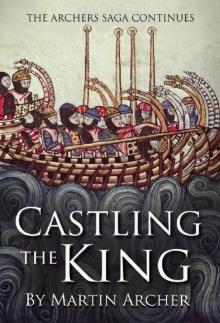 Castling The King
Castling The King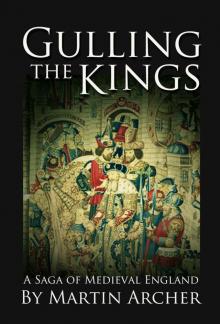 Gulling The Kings
Gulling The Kings Israel's Next War
Israel's Next War Our Next Great War
Our Next Great War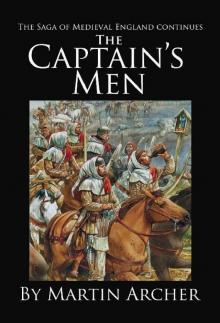 The Captain's Men
The Captain's Men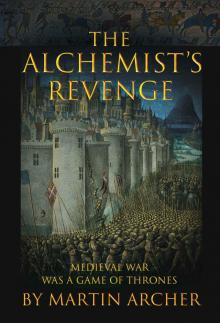 The Alchemist's Revenge
The Alchemist's Revenge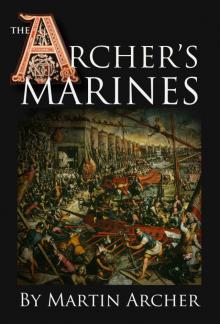 The Archer's Marines: The First Marines - Medieval fiction action story about Marines, naval warfare, and knights after King Richard's crusade in Syria, ... times (The Company of Archers Book 5)
The Archer's Marines: The First Marines - Medieval fiction action story about Marines, naval warfare, and knights after King Richard's crusade in Syria, ... times (The Company of Archers Book 5)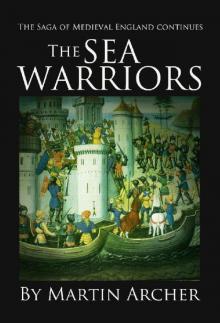 Sea Warriors
Sea Warriors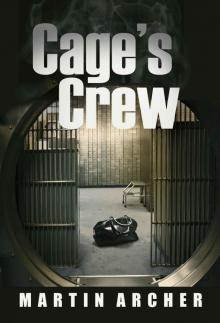 Cage's Crew
Cage's Crew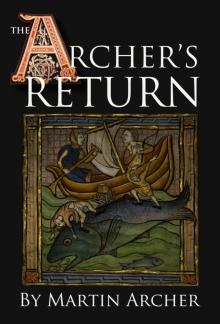 The Archer's Return: Medieval story in feudal times about knights, Templars, crusaders, Marines, and naval warfare during the Middle Ages in England in the reign of King Richard the lionhearted
The Archer's Return: Medieval story in feudal times about knights, Templars, crusaders, Marines, and naval warfare during the Middle Ages in England in the reign of King Richard the lionhearted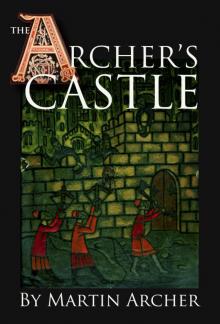 The Archer's Castle: Exciting medieval novel and historical fiction about an English archer, knights templar, and the crusades during the middle ages in England in feudal times before Thomas Cromwell
The Archer's Castle: Exciting medieval novel and historical fiction about an English archer, knights templar, and the crusades during the middle ages in England in feudal times before Thomas Cromwell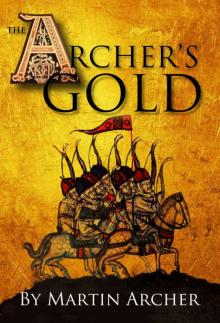 The Archer's Gold: Medieval Military fiction: A Novel about Wars, Knights, Pirates, and Crusaders in The Years of the Feudal Middle Ages of William Marshall ... (The Company of English Archers Book 7)
The Archer's Gold: Medieval Military fiction: A Novel about Wars, Knights, Pirates, and Crusaders in The Years of the Feudal Middle Ages of William Marshall ... (The Company of English Archers Book 7)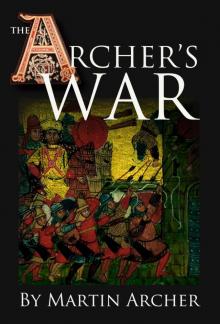 The Archer's War: Exciting good read - adventure fiction about fighting and combat during medieval times in feudal England with archers, longbows, knights, ... (The Company of English Archers Book 4)
The Archer's War: Exciting good read - adventure fiction about fighting and combat during medieval times in feudal England with archers, longbows, knights, ... (The Company of English Archers Book 4)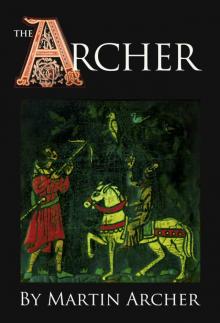 The Archer: Historical Fiction: exciting novel about Marines and Naval Warfare of medieval England set in feudal times with knights,Templars, and crusaders during Richard the lionhearted's reign
The Archer: Historical Fiction: exciting novel about Marines and Naval Warfare of medieval England set in feudal times with knights,Templars, and crusaders during Richard the lionhearted's reign